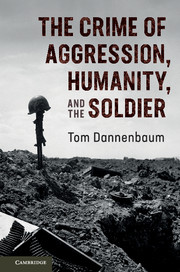Book contents
- The Crime of Aggression, Humanity, and the Soldier
- The Crime of Aggression, Humanity, and the Soldier
- Copyright page
- Contents
- Acknowledgments
- Table of Cases
- Table of Treaties and Legislation
- Table of Other Authorities
- Introduction
- Part I The Criminalization of Aggression and the Putative Dissonance of the Law’s Treatment of Soldiers
- Part II Can International Law’s Posture towards Soldiers Be Defended?
- Part III Respecting Soldiers in Institutions and Doctrine: The Internal Imperative to Reform
- Conclusion
- Index
Introduction
Published online by Cambridge University Press: 28 April 2018
- The Crime of Aggression, Humanity, and the Soldier
- The Crime of Aggression, Humanity, and the Soldier
- Copyright page
- Contents
- Acknowledgments
- Table of Cases
- Table of Treaties and Legislation
- Table of Other Authorities
- Introduction
- Part I The Criminalization of Aggression and the Putative Dissonance of the Law’s Treatment of Soldiers
- Part II Can International Law’s Posture towards Soldiers Be Defended?
- Part III Respecting Soldiers in Institutions and Doctrine: The Internal Imperative to Reform
- Conclusion
- Index
Summary
- Type
- Chapter
- Information
- The Crime of Aggression, Humanity, and the Soldier , pp. 1 - 14Publisher: Cambridge University PressPrint publication year: 2018



